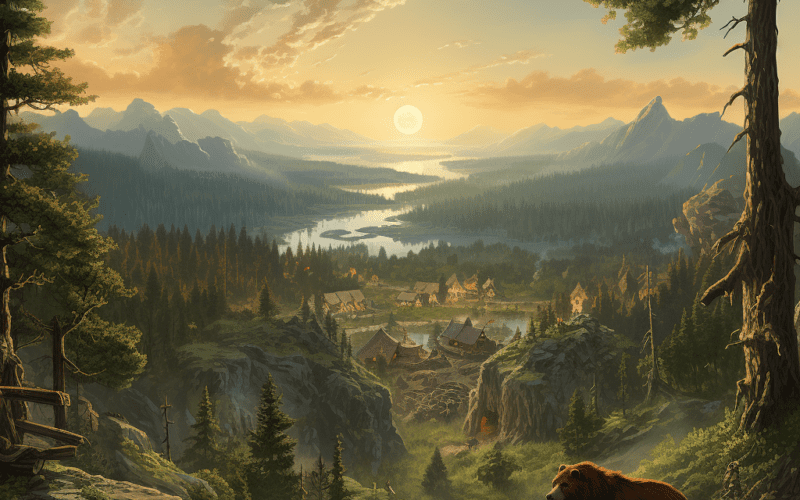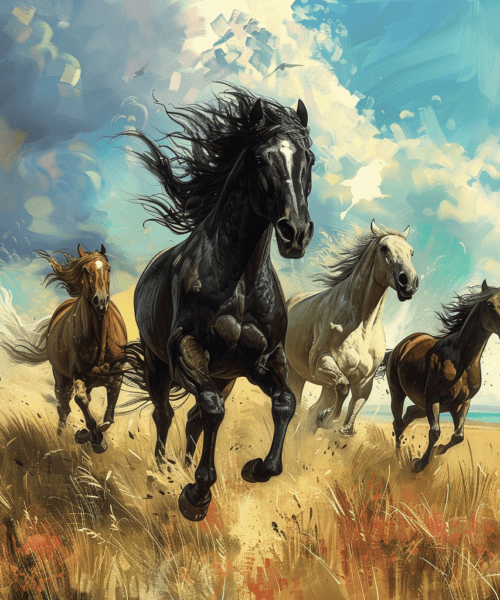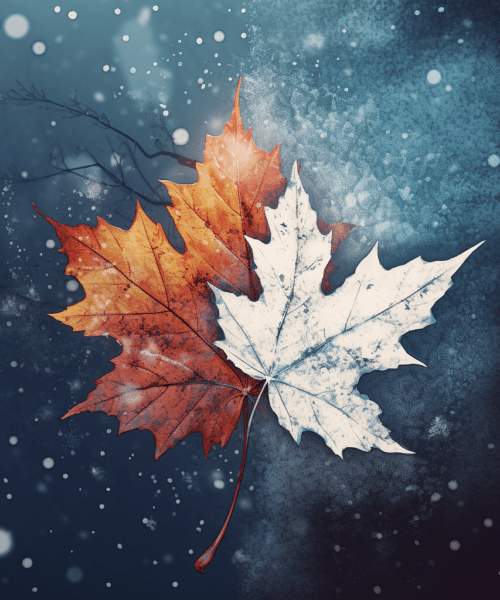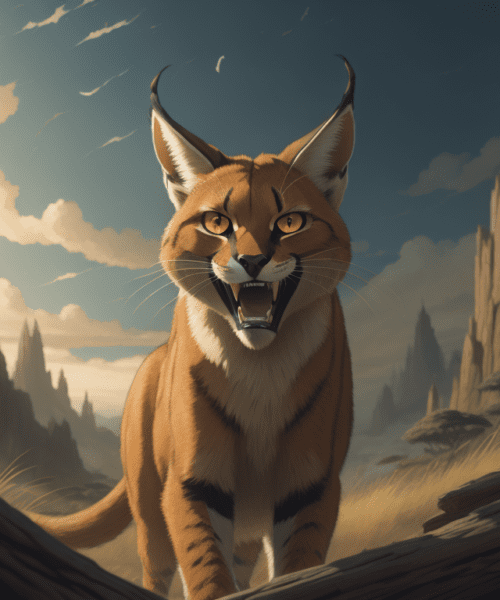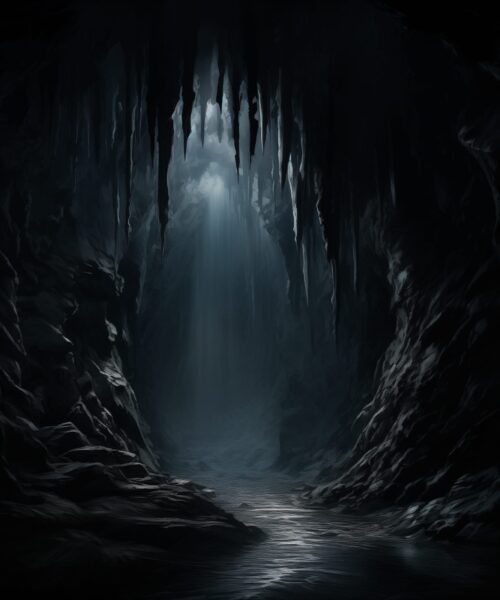Spirit of the South
By Sofia Carpinelli
The plague was spreading quickly. It started with a hacking cough that wracks your body with pain. Then boils spring up, red-hot and oozing pus. And if that’s not bad enough, you begin to go blind, your eyes covered over with a white film that can’t be removed. Finally, you start coughing blood, and then you die. There was simply no stopping it. Dakhota already lost Leeso, his youngest sister, and one of his closest friends, Wellyi. All Dakhota had left were his parents, his grandmother, and his older sister, Shemaya. Every person’s worst fear now was catching the plague. There was no cure. Once you got the plague, you were dead. Worse still, you were supposed to be confined in the last hours of your life so as not to spread the plague.[GY1]
It became dark before Dakhota realized it. He wasn’t supposed to be out in the woods after dark. That’s when the grizzly bears, huge owls, and Black Spirits came out. Sure enough, as soon as Dakhota opened the door to his house, his mother erupted.
“How dare you?” she shrieked furiously. She was carrying a spear in her hand, which made her look even more intimidating. The spear glinted in the setting sun. “Dakhota! There are bears! And spirits! And the plague! You could have died, and I wouldn’t have known! Inside! Inside! Now!” Dakhota was fiercely ushered inside the longhouse. Shemaya was waiting for him in the room they shared together, a smug look on her face.
“Got in trouble again?” she asked, amused. Dakhota scowled at his sister.
“It’s not my fault that Mother is so touchy!” he snapped. “I was just picking berries, which I didn’t even get to keep, because when I realized it was dark, I dropped them and ran home as fast as I could!”
“Oh, you poor thing,” said Shemaya, still amused. She was about to say something else when their Mother rushed in, hair disheveled, looking frightened and apprehensive.
“Chief Otaku has called a meeting,” she said, sounding terrified. “He has decided that…” she hesitated, then changed her mind. “Well, Chief Otaku will tell you. Come with me, children. Where is Leeso?” Mother’s eyes clouded over with unshed tears. Leeso, the youngest sister that had died. Dakhota felt a lump in his throat, and saw Shemaya clench her fists, as if digging into her palms with her nails would quell her sadness. Sometimes, Mother seemed to forget the fact that her youngest had been claimed by the plague forever.
She whirled around and hurried away as if hiding the tears from her son and daughter. They’d already seen her tears freely shed over Leeso’s bloated body, completely covered with the boils that came with sickness. Dakhota felt Shemaya’s hand slip into his and gave it a reassuring squeeze. Dakhota could feel the indents where Shemaya’s nails dug into her palms lately. Leeso’s death weighed heavily upon the whole family. Dakhota wished that Wellyi was here. His whole life, he was the best friend to confide in.
Shemaya and Dakhota, still holding each other’s hands, followed the wild, tangled mass that was their mother’s long, unkempt hair out of the longhouse and towards the Bonfire. It was where the tribe gathered together to cook the meat from the hunters and tell each other fantastical stories they heard from their grandparents. But now, the Bonfire was not lit. It was cold and dark, and a bunch of shadowy figures were surrounding it grimly. Chief Otaku stood upon an old, decaying stump, towering above all of the people of his tribe. The only missing members of the village were those suffering from the evil effects of the plague. Then, Chief Otaku spoke. His voice was like resonating thunder, loud, deep, rumbling, and ominous, commanding your attention, yet somehow, soothing.
“We’ve lost many to this plague,” Chief Otaku said. “Kaynor, Peian, Fenro, Coosa, Leeso.” A pang in Dakhota’s chest, Chief Otaku continued. “Sami, Venor, Wellyi,” another pang, “and Henyai.” Choked sounds resonated from the loved ones of the dead tribe members.
Dakhota couldn’t recall a Kaynor or Peian, but Fenro and Coosa had been his age, and, of course, Leeso was—had been—his sister. He didn’t know Sami, but Venor had been one of his favorite Elders, and Wellyi…Dakhota couldn’t think about Wellyi, it was too painful.
Especially because of the way he went. Dakhota remembered the two deaths with a fierce and uncomfortable wrench in his gut.
Leeso, coughing before hunting class. Mother asks her if she is alright, and Leeso nods, assuring Mother that she will be fine. She returns from the class with three large boils, larger than robin eggs, on her forehead. The next day, Leeso is covered in boils, and she scratches them painfully, causing them to bleed. Two weeks later, Leeso is coughing blood, and the next day, she is gone.
But Dakhota was with her, Dakhota concluded that Leeso was going to die after she returned with the boils. The plague was already claiming lives rapidly before Leeso caught it. Everybody knew that it was a danger to the people, so when Leeso received sure signs of the plague, the whole family knew that the stars would claim her soon. And when she was gone, it wasn’t a surprise. It was horrible, but it wasn’t surprising. Dakhota mentally prepared himself for the loss of Leeso. Wellyi…had been different.
A knock rings through the house, heavy knuckles knocking against our door. It’s Wellyi’s mother, probably here to ask what Dakhota did with Wellyi that day. But she has tear tracks on her eyes, which are red and puffy, and she looks disheveled and succumbed to grief. How Mother looks since Leeso’s death. She tells us that Wellyi was taken by the plague last night and that she was sorry he hadn’t seen them. She hadn’t wanted to spread the horrible boils. Then she leaves, still weeping, and Mother goes out of the house to comfort her, and for both mothers to remember the deaths of their children from the same plague together. Leeso and Wellyi, two of the most important people of Dakhota’s life, both dead within two days of each other.
Lost in memory, Dakhota forgot that Chief Otaku was still speaking, until the words he was saying caught his attention.
“We are embarking on a quest, sent by the stars,” Chief Otaku said. “The lights that shine above have declared a way to save our people from this plague before we lose more. By now, many quarantined tribemates will be on their way to leaving us forever, but the rest of you can be saved.”
“What is the quest?” called a member from the mist-shrouded crowd of onlookers, brave enough to interrupt the chief’s speech. Chief Otaku’s dark eyes were illuminated by the glinting stars above their heads, twinkling merrily, as if many people were not dying. As if the wails of the dying and the loved ones of the dying did not pierce the air every night, ripping through the hearts of all of the others, trying to sleep and forget their own losses.
“The quest,” Chief Otaku replied, “is to find the Spirit of the South, and ask for its guidance in these troubled times.” Murmurs erupted from the crowd, and Dakhota would have been murmuring himself with Leeso or Wellyi, but they were no longer by his side. Shemaya was not one for gossip. Chief Otaku waited calmly until his tribe stopped their endless whispers.
More questions were asked.
“Who will go on this quest? And where is the Spirit of the South? And what form does it take?”
Chief Otaku raised a large, calloused hand calmingly. “That is yet to be decided, and if the Spirit of the South will be of any help to us, it will reveal itself to us when the time comes. We will be sending two younger members of the tribe. We need strong, healthy bucks to go on this quest. I will not accept requests from Elders, or hunters who are feeding us, or healers who are comforting our dying in the last hours of their lives. Do we have any volunteers?” Silence for a few moments, except for the endless choir of frogs and crickets. Then, a loud feminine voice spoke.
“I will go,” she said.
“Come forth,” said Chief Otaku, dipping his head. A tall, lithe, graceful girl with cascading black hair like a waterfall, braided in places, stepped forward. She looked strong, but also flexible, altogether a powerful warrior, and her dark, stormy eyes looked cold and menacing, even in the moonlight. Dakhota could not remember her name, though he recognized her by sight.
“I will go,” she repeated. Her voice wavered more this time, as if the realization of what she had said just sank in.
“Brave girl,” said Chief Otaku admiringly. “You are a great asset to our village. You must know–” his sentence was cut off by a hacking cough from one of the longhouses, then complete silence, as if an echo cut off before it ended. Pounding feet followed, as a woman raced towards the longhouse, flung open the door, and bolted inside. A scream tore through the air. The person inside the longhouse was taken by the plague. A sadness engulfed Dakhota, for the unknown person, and for the woman who wept now. Another twinge, as he remembered the scream that ripped from his mother when they watched Leeso’s chest suddenly stop rising and falling. Her chest froze in the center of an exhale, the mist from her breath staining the air, and never moved again. Chief Otaku tried to ignore this horrible turn of events.
“You must know that this is a dangerous quest, and the two people we are looking for may not return from the freezing South. We already live in a cold region, named Ice-Cold Plains by our ancestors, but even farther South is worse. There will be no shelter, no fire, no human body-warmth to shield you from the blizzards.” The girl stood tall and strong.
“I know,” she said. “I will face it like a true warrior of the Ice-Cold Tribe.”
Chief Otaku nodded. “Then we need one more volunteer. Will any other young person be as brave as Marsa, or will I have to hand-select you?” Marsa was her name. She was pretty, but not Dakhota’s type. She looked argumentative and aggravatingly stubborn. Shemaya’s hand tightened around his. Surely she wouldn’t be chosen randomly by Chief Otaku? She was only four days away from becoming a woman, and, almost certainly, this quest would take more than four days, if the adventurers returned at all.
Nobody volunteered. The thought crossed Dakhota’s mind, but he dismissed it as quickly as it came. Nobody would be foolish—and yes, brave—enough to embark on this journey except for Marsa, who known to be hard-headed, reckless, and always thirsty for praise.[GY2]
Chief Otaku looked sad when nobody stepped forward, as if he wanted all of his young tribe members to risk their lives on a seemingly ill-fated journey toward the coldest place on earth. Dakhota had a feeling that both people who left would end up encased in ice, and the whole village would either die out or have to relocate somewhere else. Then Chief Otaku covered his eyes with a beaded scarf, and moved his hand around randomly, as if to prove he wasn’t hand-picking anyone on purpose. It was all chance. Dakhota found himself thinking, please not me.
Mother would lose her mind. Shemaya would cry. Father…I don’t know what Father would do. He didn’t even cry after Leeso’s death. Would he care? Please not me. Anybody but me.
Dakhota imagined himself as a tiny piece of a board game, chosen by a small child at random, to be captured and turned immobile for the rest of the game. Or, in Dakhota’s case, the rest of his life.
But Chief Otaku’s finger didn’t land on Dakhota. It landed on Shemaya.
Gasps and outraged noises erupted from the crowd. The whole small village knew that Shemaya’s womanhood was coming in four days. To be sent into a death trap right before that was outrageous. Chief Otaku seemed to think so as well.
“I do not want a girl who has almost reached womanhood going on this quest. She could be helping elsewhere.” Then his dark green eyes shifted to Dakhota. “Since you are closest, and her brother, after all, you will travel South with Marsa, find the Spirit, and save your Tribe. Thank these powerful and immensely brave young warriors. They may be the only hope of saving all of your lives!” A round of applause sounded, but Dakhota couldn’t quite tell if it was proud clapping or sympathetic clapping. He hoped it wasn’t the latter. “You will go tonight. We have no time to spare. Pack your bags, and make sure you get waterskins and cold-resistant satchels. We don’t want your food freezing before you can get to it. Go on, pack with each other. You will need each other’s help if you are to survive, and the Spirit of the South has always been attracted to unity.”
Dakhota waited until Marsa walked towards him, finally reaching him and then scowling in his face. He walked towards the longhouse where they stored food and water for the coldest months. Marsa packed quickly and sparsely, just enough for her to survive for around two weeks without being uncomfortable. The bag wouldn’t weigh down her shoulders so much, making it far easier to travel.
Dakhota, wanting to even out Marsa’s small food stores, decided to pack heavier. Perhaps Marsa could be convinced to trade satchels with Dakhota every once in a while, in exchange for Dakhota bringing enough food for both of them to last a while if needed? This wasn’t likely, but Dakhota would rather have a heavy bag than be starving. He’d seen people starve to death and knew how horrible it was.
They left the longhouse. Most of the villagers already retired to bed, nothing more to see. Only Dakhota’s family, Marsa’s family, and Chief Otaku were left out. Chief Otaku shook Dakhota’s hand, kissed Marsa’s cheek, and blessed them by the stars before leaving. Marsa’s family just squeezed her shoulders and told her to save her village before returning. No wishing her safety, or saying they loved her, or shedding tears. Dakhota could see what kind of family Marsa was raised by.
His family was in shambles. His Mother seemed to have been tearing her hair out and weeping so hysterically that she’d been fed chamomile, a calming herb, to help her avoid blacking out. His father wasn’t there, probably on a patrol. Would Dakhota manage to see him before he perhaps never returned? Probably not. Father never flinched away from his duties, even for his children. And Shemaya was silently crying, glossy tears sliding down her cheeks. She just hugged Dakhota quickly and fiercely before leaving, as if she couldn’t handle any more grief. His Mother clutched at his hands as if they were her last lifeboat, and gasped in his ear.
“You can not die. You must return to me. I can not lose you as well! It will destroy me, Shemaya, and your Father. Find the Spirit, and return home, even if it means not bringing the girl with you! Come back!” Then she whirled around and raced towards her longhouse, following Shemaya’s footsteps.
Marsa turned to stare at Dakhota, hands on her hips.
“Are you ready to find this Spirit?”
“Yes,” Dakhota said. “But where do we go?”
“You heard Chief Otaku as well as I did,” Marsa said grimly. “Just go South, don’t die, and hope she shows herself.”
Then they began to walk. They trudged through the endless snow. Soon, the falling flakes blocked their village from view entirely. When Dakhota looked back and couldn’t see the familiar longhouses, or even the forest they hunted in, the journey suddenly became real. He could really die on this journey. In fact, he probably would die. Never see his Father again. And maybe Marsa would die just like him. Would any of her family miss her? Wouldn’t that be better than tearing holes in your family like Leeso had done, by making her family love her and then lose her?
Dakhota didn’t know. But they walked. Endlessly. Into blinding white oblivion. They rarely stopped, only to grab something from their satchels, wipe the sleet from their eyes, or rub their noses with their moccasin gloves. Dakhota’s eyes felt like chunks of ice. They seemed to be frozen. He wondered if the whiteness around him wasn’t actually snow, just his eyes malfunctioning. Was he going blind? But when he looked sideways he could vaguely distinguish Marsa’s figure, the only thing that reassured him that his eyes were still working.
After what felt like hundreds of years of walking, the blizzard abruptly stopped.
The last flakes fell, and a peacefulness settled over the scenery. The snow was no longer a dangerous, terrible thing, but a soft blanket over the grasses. Dakhota looked over and saw Marsa, with snow dampening her hair, and white flakes in her eyelashes, looking frozen and numb and half-dead, but alive. Dakhota wondered if he looked the same.
Then suddenly, Marsa laughed. Dakhota realized he had never heard Marsa laugh. She was always serious, or arguing about something, never laughing. It was a hysterical laugh, a we-should-have-died-but-we-didn’t laugh. And Dakhota joined in. That laugh was perfectly justified.
They laughed for a while, just relieved to be alive, before Marsa turned serious again.
“The blizzard stopped, but I doubt we’re even close to the Southernmost end of the Plains. We probably still have weeks left of walking, and many more blizzards before the Spirit reveals herself.” If she ever does, both minds chimed together, the unspoken words that brains couldn’t help but think.
“Should we eat something?” Dakhota suggested. Marsa rubbed her belly thoughtfully.
“We aren’t starving yet,” she mused aloud. “Perhaps we should wait until we’re really hungry and can’t go any further unless we eat…but I am getting very hungry. Yes, let’s eat, but remember, we need to ration our supplies, and I only brought a little bit.” As soon as Dakhota removed the satchel from his shoulders, he realized how heavy it really was. His shoulders felt like they’d been carrying polar bears for the last few hours. He opened his satchel, and it nearly burst with the amount of food he packed. Marsa’s eyes widened.
“You packed so much food!” she nearly shouted. “How did you hold that the whole way?” Dakhota didn’t answer, food already in his mouth. Soon Marsa joined in. When they decided they had eaten more than enough, they re-folded their satchels, hitched them over their shoulders, and continued their seemingly endless trudge.
The sun rose, and they still continued walking. Finally, Dakhota felt his spirits dampen considerably. The sun began to lessen its rays. It was afternoon. Nothing was happening. They couldn’t even be completely sure they were still headed South, because the clouds were covering the sun, and the snowy mist covering everything would make it difficult to stay in a straight line anyway.
Dakhota erupted, “I bet there isn’t even a Spirit of the South! I bet it doesn’t exist! Chief Otaku sent us on a fruitless mission that will just get us killed! We’re looking for an entity that isn’t a thing! This is hopeless! Why would we be doing this?”
“Why do you have such doubt in your heart, little warrior?” asked a soft voice. Dakhota whirled around to face Marsa, whose eyes were glittering with frost.
“Do you not doubt anything?” Dakhota shouted, pointing accusingly at Marsa. “You don’t have the teeniest little doubt in your mind that this is hopeless?” Marsa immediately grew defensive.
“I didn’t say anything!” she yelled. “Do you think I’m stupid enough to not realize that I’d die on this journey? That’s why I volunteered! There’s no place for me back at the village, and I’ll die eventually, so might as well go for a good cause! My family won’t miss me, nobody else in the village will miss me, so it doesn’t matter! It will only hurt me. Not anybody else.” Her voice was choked and trembling, barely suppressed tears threatening to leak out.
Dakhota knew it wouldn’t be good if the tears did escape because they would freeze into painfully cold streaks on her cheeks. He felt like crying himself and wondered if his voice would be wavering the same way as Marsa’s if he hadn’t been so angry when he’d spoken before. Then Marsa fell silent, her eyes still wet.
“You are both so doubtful of the things that exist,” said the soft voice again. This time, Dakhota knew it was not Marsa speaking, for her mouth did not move. She looked as surprised as he felt at the soft, sparkling tones of the speaker. Dakhota whirled around, looking for anything around him, but all he saw were the white tones of snow. Oh! There, a few feet away, was a smaller-than-average white she-wolf, sitting and staring at him serenely with cobalt blue eyes, tail curled around her paws, and black nose glistening in the cold. Dakhota turned away from her, still admiring her silky coat and powerful muscles rippling under that aura of powerful peacefulness.
“Look back at me. You should show respect to a Spirit, little warriors.” Marsa’s mouth suddenly fell open, gaping like a speared fish.
“The she-wolf!” she gasped. “The she-wolf! The wolf spoke! The wolf–oh my stars!” She fell into a kneeling position, ignoring the fact that the snow’s wetness would be seeping through the thinner layers of her animal-hide leggings later. Dakhota turned to face the she-wolf again, and realized that, yes, the wolf’s eyes sparkled intelligently, and now it seemed to be…glowing? Spirals of glittering, majestic gold were flowing into her white fur, turning her into a winter-like sun, shining before Dakhota. He dropped to his knees, just like Marsa. This was a Spirit, a real Spirit, the Spirit. There was no one else she could be!
Shining like gold, she uncurled her tail from her paws and gracefully leapt off of the rock she’d been sitting on. She padded softly towards the two tribemates, and Dakhota noticed that she left no footprints, nor did the snow crunch under her body weight.
She must weigh less than nothing, Dakhota realized. Spirits aren’t fully formed unless they wish to be. She could be in the form of vapor, or mist, or cloud, how would I know? She may not be completely solid.
Spirits were magic, almighty things in that way. The beautiful she-wolf placed her nose against Marsa’s own pink, freezing nose first, then Dakhota’s. It was cold, and it sent shivers down Dakhota’s spine, but he felt filled with sudden energy, blessed by some sort of otherworldly force. This was the true power of a Spirit. Her blue eyes seemed to bore into his soul.
“You have come to find me,” she said. It was not a question. She knew everything that was going on in Dakhota and Marsa’s village. She just wished for the humans to share their knowledge with her properly. “You have come to seek my guidance. You have traveled far, if not for as long as many brave warriors might have. I saw the love and the loss in your hearts, and the determination, and, yes, doubt that drove you on your path to me.” Her eyes glistened with an intelligence unbeknownst to even humans, sparkling like rays of sunlight on morning dew. “I admire your courage, little warriors. Why do you seek my attentions?”
“Our village is dying!” Dakhota burst out. He practiced in his head speaking diplomatically and reverently to this magical beast before him, but, filled with the rage and the hurt and the awe dazzling his senses, he couldn’t get the words out. It burst out of him like an uncontrolled force was wrenching it from him unmanned. “The plague has claimed so many lives, and will claim many more if you don’t help us! My best friend…my little sister…please, you need to help us!”
“I do not need to do anything,” the wolf said quietly, almost dangerously, and Dakhota realized he’d spoken wrongly. Of course she didn’t have to do anything, she was an all-powerful entity, controller of the South, the freezing winds, and the roaring blizzards. What did petty human matters mean to her? Near nothing, Dakhota suspected. But Spirits were always spoken about as human-helpers, natural forces that worked in human favor, unless they were the dark Black Spirits that prowled in the shadows.
“Of course you don’t,” Marsa spoke softly, little more than a whisper. “But will you? Please? People—adults, children, Elders—are dying, and we can’t stop it without you. We love you. We speak good truths about you, and I’m sure you don’t have a spot in your heart that will let a whole human civilization be wiped out when you could have stopped it. Please, please. I have been fortunate not to lose anyone yet, but I will eventually, if you don’t help us.”
The wolf nodded slowly, as if debating something.
“Stand,” she said finally. Dakhota and Marsa immediately stood up, not wanting to hesitate at all at the wolf’s orders. And then the wolf started shifting. She first started growing taller, then her nose grew smaller, her ears flattened, and only a long mane of hair remained spotlessly white. She transformed into a dazzling girl, Dakhota’s age. She had snow-white skin, and her white hair was longer and thicker than anything Dakhota had ever seen before, even an animal’s dense coat. Her sparkling blue eyes remained the same, wise and bright, and not a human eye color.
But she isn’t human, Dakhota reminded himself. She is still the Spirit, just in human form. I mustn’t forget to show reverence before her. She could smite me as easily as I shoot a rabbit with my bow. Almost effortlessly. Probably effortlessly for her. I am only a small piece in this universe compared to her vast power.
She took Dakhota’s hand in one of hers. It was ice-old, even through his glove. She did the same thing to Marsa.
“Don’t struggle. Focus on me. On my aura. Focus on the way my fingers feel, and the way my breath breathes the same air as you. Concentrate on my whole being, on nothing else.” Dakhota thought that it was very difficult to think of anything other than the godly, beautiful girl beside him.
“What is your name?” asked Marsa softly. The eyes of the Spirit softened and suddenly filled with quiet sadness.
“I do not have a name. Names are a human creation. Spirits are not named, they simply are. We just exist. Forces of nature combined into a certain group of atoms and given the power to control the universe. But, being humans, I know that you like naming things. You may give me a name.” Dakhota wondered what name could possibly be befitting of such a marvelous creature. None, he thought, but Marsa seemed to think otherwise.
“Naomi,” she suggested. “I think you can be called Naomi.”
“Naomi,” said the Spirit thoughtfully. “A beautiful name, really. Befitting of a Spirit of ice and cold. You may call me Naomi, little warriors, for now. Until we part at the end of your journey. Focus on me now. Nothing else. Not your village, not each other, not the plague, just me. If you don’t and fail to think of just me, there will be dire consequences.” So Dakhota focused his whole being on feeling Naomi. He followed her instructions. Her fingers entwined with his, her hair blowing in the breeze, tickling his neck. He pictured her knowing, powerful eyes in his head and imagined sinking into them like endless pools under the ice.
And then he wasn’t Dakhota anymore. He was nobody, simply watching a scene, all worries forgotten. He had no thoughts of his own, just a memory unfolding under his eyelids, prompted by the Spirit–Naomi–holding his hand.
She is cold. So cold. But she knows it will be over soon. The boils on her skin itch, but she is too weak to lift an arm to scratch them. She struggles to hold her eyelids open, to make out the faces peering over her. There are three of them, no, four, but one is off in the corner. She tries to make them out, but her vision has become blurred during the sickness. She lets out a hacking cough. One of the faces bends closer, and a hand touches her mouth. It comes back clean. She isn’t coughing blood yet, which means she still has time. Time to live. Time to suffer. But it helps to know that the suffering will be over before she realizes it. Maybe two days. Three. Once the blood comes from her coughs she’ll know it will be time to say goodbye.
What is her name? She struggles to remember. Everything seems hazy these days. Oh, yes. Leeso. Her name is Leeso. She recognizes the faces over her now. There’s Mother, and Shemaya, and Dakhota, her siblings. And the person off in the corner–Father. Probably not caring that she is hours away from death. She is cold again, and she begins shivering, which sends ripples of discomfort through her whole body. Her boils begin itching. Throbbing. Pounding against her skin like huge, hungry bugs eating away at her. She wants it all to end. She knows she is going to die, she watched others go from the same plague that she has now. Is anybody she knows stuck with the same horrible haziness, fever, and itchy boils? The same hacking cough? The same threat of imminent death over their heads, as soon as the blood arrives?
She isn’t scared, though. It’s funny in that way. Death has always been a thing to fear for her. She feels, now, that it was always coming for her, just earlier than many people had expected. But now that it is here, she really knew she’d be going towards the stars soon. The thing that scares her most is the tear tracks on her family’s faces. They make her sad, knowing that her family is sad about losing her. Don’t be sad, she thinks, I’m peaceful. I’ve come to terms with my death. I fear not the loss of life. Not anymore. Take me, claim me, I am yours. Just don’t be sad. Not forever. I am happy. I am happy. I am happy. Forevermore. The stars are mine now. I am the stars. We belong together. We always have, even if we didn’t know it.
I am happy.
No, happy isn’t the right word, she thinks. She isn’t happy that she is leaving her family behind, or that she is causing them grief. She changes the wording in her mind. I am peaceful. I am peaceful. Please know this. I am Leeso, and I am peaceful, and you can be sad, but not forever. Not on my behalf. Thank you. I love you.
Then she drifts away.
Dakhota is wrenched out of Leeso’s mind with a horrible jolt. Tears clog his throat, threatening to choke him, to never let him go. Was this really how Leeso felt in her last moments? He wrenched his hand away from Naomi’s. The Spirit didn’t look troubled.
She turned calmly towards him.
“Why would you show me that?” Dakhota choked. “Why would you make me see those things again?”
“Did you hear what she was thinking at the end, little warrior?” Naomi asked quietly. “Loss is hard, but it can’t last forever. Leeso was a wise, tiny girl at the end of her life, as many who are now lost to death become before they are gone. She wished she could have told you how she felt. I am sorry that the plague consumed her voice before she could. I just thought that you should know that many of the dead feel the same way about it, now in the stars. Death really isn’t such a terrible thing for those dying. It is far more troubling for those living. When it is your time to die, you will understand.” She blinked her large, soothing eyes.
“What now?” asked Marsa, who also looked teary. The she-wolf turned towards the girl.
“You understand what you have learned, Marsa of the humans?” Marsa pressed herself into Naomi.
“Yes,” whispered Marsa hoarsely. She met Naomi’s wise eyes and held her gaze. “Thank you. You’ve given me so much hope that I never thought I’d have.” Naomi’s eyes softened as Marsa’s gratefulness washed over her.
Dakhota wondered if she experienced Leeso’s memory, or something entirely different. He didn’t think he’d ever ask. Some things just had to remain within your own soul.
“Now it is time for you to return to your village. The walk will be long and tiring, but you will not die on the way. You still have many more years ahead of you. You will go home to find that the plague is cured, if you make a poultice of moonberries and leave them under the stars tonight. Then I will know that you believe me and have accepted my offer. The dead will not be re-awoken, but those who got sick two days ago will be healed, and nobody else will catch the horrible sickness. Goodbye, little warriors, and share as much as you would like with your village.”
Naomi’s eyes twinkled, slightly mischievous, suddenly more like the eyes of a wolf than a human or a spirit. “And tell Chief Otaku that I like his new beard.”
Then Naomi gracefully shifted back into the majestic wolf and turned away from them. She looked backward, locking eyes with both of the tribemates one last time, and pranced away, still not leaving tracks in the snow.
Marsa and Dakhota looked towards each other, suddenly feeling very close to each other. Closer, even, than when they laughed after the long, perilous first leg of their journey.
“Let’s go back, then,” said Marsa. Dakhota blinked in bewilderment. He couldn’t believe it was over already, and, at the same time, couldn’t believe how much he’d witnessed in those last few days. It was a whirling wind in his brain, sucking everything else away from him.
But he trusted Naomi. He knew that his village was safe now, and nobody would ever die of that plague again–as long as they prepared the moonberry poultice Naomi wanted.
The sun was setting by now, for it had been afternoon when they’d found the she-wolf waiting for them. Dakhota turned towards the nearest bush and plucked a few berries from it.
He mashed them with his hand, squeezing the juices into a nearby hole in the snow.
“There,” he said, inhaling deeply. “It may take us a while to get home, but the village is safe.” Marsa stared towards the spot where Naomi disappeared.
“How do we get there?” she asked quietly.
“I guess we just keep walking,” Dakhota said. “Naomi said we’d travel safely. We just let the West wind blow us in the right direction.” Marsa nodded, and smiled. Just a tiny bit.
Dakhota realized he no longer felt horrible about Leeso’s death. He missed her, but he didn’t feel wracked with grief. As long as Leeso was peaceful with death, so was Dakhota.
He linked hands with Marsa, slung his satchel over his shoulder, casting one last glance towards the snowbanks where the she-wolf had disappeared forever, and started back home.

